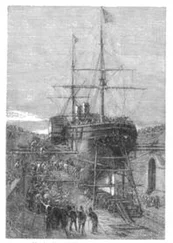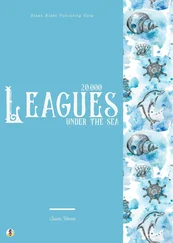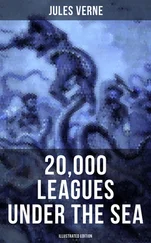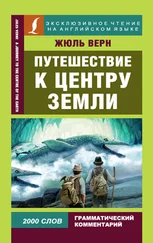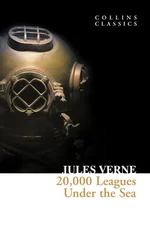Jules Verne - Twenty Thousand Leagues Under the Sea
Здесь есть возможность читать онлайн «Jules Verne - Twenty Thousand Leagues Under the Sea» — ознакомительный отрывок электронной книги совершенно бесплатно, а после прочтения отрывка купить полную версию. В некоторых случаях можно слушать аудио, скачать через торрент в формате fb2 и присутствует краткое содержание. Жанр: sf_writing, на английском языке. Описание произведения, (предисловие) а так же отзывы посетителей доступны на портале библиотеки ЛибКат.
- Название:Twenty Thousand Leagues Under the Sea
- Автор:
- Жанр:
- Год:неизвестен
- ISBN:нет данных
- Рейтинг книги:5 / 5. Голосов: 2
-
Избранное:Добавить в избранное
- Отзывы:
-
Ваша оценка:
- 100
- 1
- 2
- 3
- 4
- 5
Twenty Thousand Leagues Under the Sea: краткое содержание, описание и аннотация
Предлагаем к чтению аннотацию, описание, краткое содержание или предисловие (зависит от того, что написал сам автор книги «Twenty Thousand Leagues Under the Sea»). Если вы не нашли необходимую информацию о книге — напишите в комментариях, мы постараемся отыскать её.
Twenty Thousand Leagues Under the Sea — читать онлайн ознакомительный отрывок
Ниже представлен текст книги, разбитый по страницам. Система сохранения места последней прочитанной страницы, позволяет с удобством читать онлайн бесплатно книгу «Twenty Thousand Leagues Under the Sea», без необходимости каждый раз заново искать на чём Вы остановились. Поставьте закладку, и сможете в любой момент перейти на страницу, на которой закончили чтение.
Интервал:
Закладка:
"Sir," said I to Captain Nemo, "to you belongs the honor of first setting foot on this land."
"Yes, sir," said the captain; "and if I do not hesitate to tread this South Pole, it is because, up to this time, no human being has left a trace there."
Saying this, he jumped lightly on to the sand. His heart beat with emotion. He climbed a rock, sloping to a little promontory; and there, with his arms crossed, mute and motionless, and with an eager look, he seemed to take possession of these southern regions. After five minutes passed in this ecstasy, he turned to us.
"When you like, sir."
I landed, followed by Conseil, leaving the two men in the boat. For a long way the soil was composed of a reddish, sandy stone, something like crushed brick, scori?, streams of lava, and pumice-stones. One could not mistake its volcanic origin. In some parts, slight curls of smoke emitted a sulphurous smell, proving that the internal fires had lost nothing of their expansive powers, though, having climbed a high acclivity, I could see no volcano for a radius of several miles. We know that in those antarctic countries, James Ross found two craters, the Erebus and Terror, in full activity, on the 167th meridian, latitude 77 32'. The vegetation of this desolate continent seemed to me much restricted. Some lichens of the species usnea melanoxantha lay upon the black rocks; some microscopic plants, rudimentary diatomas, a kind of cells, placed between two quartz shells; long purple and scarlet fucus, supported on little swimming bladders, which the breaking of the waves brought to the shore. These constituted the meager flora of this region. The shore was strewn with mollusks, little mussels, limpets, smooth bucards in the shape of a heart, and particularly some clios, with oblong membranous bodies, the head of which was formed of two rounded lobes. I also saw myriads of northern clios, one and a quarter inches long, of which a whale would swallow a whole world at a mouthful; and some charming pteropods, perfect sea-butterflies, animating the waters on the skirts of the shore.
Among other zoophytes, there appeared on the high bottoms some coral shrubs, of that kind which, according to James Ross, live in the antarctic seas to the depth of more than 1,000 yards. Then there were little kingfishers, belonging to the species procellaria pelagica, as well as a large number of asteriads, peculiar to these climates, and starfish studding the soil. But where life abounded most was in the air. There thousands of birds fluttered and flew of all kinds, deafening us with their cries; others crowded the rocks, looking at us as we passed by without fear, and pressing familiarly close by our feet. There were penguins, so agile in the water that they have been taken for the rapid bonitos, heavy and awkward as they are on the ground; they were uttering harsh cries, a large assembly, sober in gesture, but extravagant in clamor. Among the birds I noticed the chionis, of the long-legged family, as large as pigeons, white, with a short conical beak, and the eye framed in a red circle. Conseil laid in a stock of them, for these winged creatures, properly prepared, make an agreeable meat. Albatrosses passed in the air (the expanse of their wings being at least four yards and a half), and justly called the vultures of the ocean; some gigantic petrels, and some damiers, a kind of small duck, the underpart of whose body is black and white; then there were a whole series of petrels, some whitish with brown-bordered wings, others blue, peculiar to the antarctic seas, and so oily, as I told Conseil, that the inhabitants of the Ferroe Islands had nothing to do before lighting them, but to put a wick in.
"A little more," said Conseil, "and they would be perfect lamps! After that, we cannot expect nature to have previously furnished them with wicks!"
About half a mile further on, the soil was riddled with ruff's nests, a sort of laying ground, out of which many birds were issuing. Captain Nemo had some hundreds hunted. They uttered a cry like the braying of an ass, were about the size of a goose, slate color on the body, white beneath, with a yellow line round their throats; they allowed themselves to be killed with a stone, never trying to escape. But the fog did not lift, and at eleven the sun had not yet shown itself. Its absence made me uneasy. Without it no observations were possible. How then could we decide whether we had reached the pole? When I rejoined Captain Nemo, I found him leaning on a piece of rock, silently watching the sky. He seemed impatient and vexed. But what was to be done? This rash and powerful man could not command the sun as he did the sea. Noon arrived without the orb of day showing itself for an instant. We could not even tell its position behind the curtain of fog; and soon the fog turned to snow.
"Till to-morrow," said the captain quietly, and we returned to the Nautilus amid these atmospheric disturbances.
The tempest of snow continued till the next day. It was impossible to remain on the platform. From the saloon, where I was taking notes of incidents happening during this excursion to the polar continent, I could hear the cries of petrels and albatrosses sporting in the midst of this violent storm. The Nautilus did not remain motionless, but skirted the coast, advancing ten miles more to the south in the half-light left by the sun as it skirted the edge of the horizon. The next day, the 20th of March, the snow had ceased. The cold was a little greater, the thermometer showing two degrees below zero. The fog was rising, and I hoped that that day our observations might be taken. Captain Nemo not having yet appeared, the boat took Conseil and myself to land. The soil was still of the same volcanic nature; everywhere were traces of lava, scori?, and basalt; but the crater which had vomited them I could not see. Here, as lower down, this continent was alive with myriads of birds; but their rule was now divided with large troops of sea-mammals, looking at us with their soft eyes. There were several kinds of seals, some stretched on the earth, some on flakes of ice, many going in and out of the sea. They did not flee at our approach, never having had anything to do with man; and I reckoned that there were provisions there for hundreds of vessels.
"Sir," said Conseil, "will you tell me the names of these creatures?"
"They are seals and morses."
It was now eight in the morning. Four hours remained to us before the sun could be observed with advantage. I directed our step toward a vast bay cut in the steep granite shore. There, I can aver that earth and ice were lost to sight by the numbers of sea-mammals covering them, and I involuntarily sought for old Proteus, the mythological shepherd who watched these immense flocks of Neptune. There were more seals than anything else, forming distinct groups, male and female, the father watching over his family, the mother suckling her little ones, some already strong enough to go a few steps. When they wished to change their place, they took little jumps, made by the contraction of their bodies, and helped awkwardly enough by their imperfect fin, which, as with the lamantin, their congener, forms a perfect forearm. I should say that in the water, which is their element-the spine of these creatures is flexible-with smooth and close skin and webbed feet, they swim admirably. In resting on the earth they take the most graceful attitudes. Thus the ancients, observing their soft and expressive looks, which cannot be surpassed by the most beautiful look a woman can give, their clear voluptuous eyes, their charming positions, and the poetry of their manners, metamorphosed them, the male into a triton and the female into a mermaid. I made Conseil notice the considerable development of the lobes of the brain in these interesting cetaceans. No mammal, except man, has such a quantity of cerebral matter; they are also capable of receiving a certain amount of education, are easily domesticated, and I think, with other naturalists, that, if properly taught, they would be of great service as fishing-dogs. The greater part of them slept on the rocks or on the sand. Among these seals, properly so called, which have no external ears (in which they differ from the otter, whose ears are prominent), I noticed several varieties of stenorhynchi about three yards long, with a white coat, bulldog heads, armed with teeth in both jaws, four incisors at the top and four at the bottom, and two large canine teeth in the shape of a "fleur de lis." Among them glided sea-elephants, a kind of seal, with short flexible trunks. The giants of this species measured twenty feet round, and ten yards and a half in length; but they did not move as we approached.
Читать дальшеИнтервал:
Закладка:
Похожие книги на «Twenty Thousand Leagues Under the Sea»
Представляем Вашему вниманию похожие книги на «Twenty Thousand Leagues Under the Sea» списком для выбора. Мы отобрали схожую по названию и смыслу литературу в надежде предоставить читателям больше вариантов отыскать новые, интересные, ещё непрочитанные произведения.
Обсуждение, отзывы о книге «Twenty Thousand Leagues Under the Sea» и просто собственные мнения читателей. Оставьте ваши комментарии, напишите, что Вы думаете о произведении, его смысле или главных героях. Укажите что конкретно понравилось, а что нет, и почему Вы так считаете.

